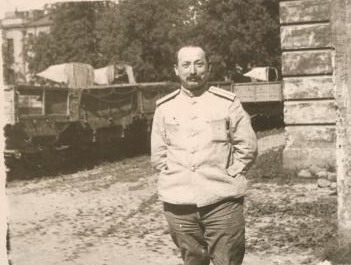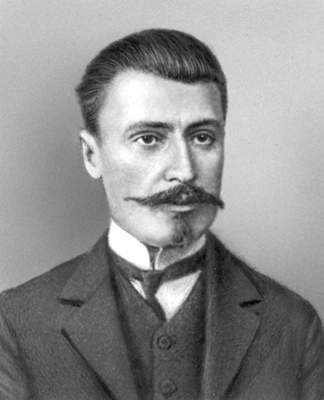<Back to Index>
- Leader of the Mensheviks Fyodor Ilyich Dan, 1871
- Leader of the Georgian Mensheviks Irakli (Kaki) Tsereteli, 1881
PAGE SPONSOR

Fyodor Ilyich Dan (Russian: Фёдор Ильич Дан) (October 19, 1871, Saint Petersburg – January 22, 1947, New York) was one of the leaders of Menshevism.
Fyodor Dan was born to a Jewish family in St. Petersburg. His original surname was Gurvitch. While still a young man he joined the Union of Struggle for the Emancipation of the Working Class. He was arrested in 1896 and exiled in Oryol for three years. On his return he joined the Russian Social Democratic Labor Party and went to London for their Second Congress in 1903. Dan aligned himself with Julius Martov who wanted to have a larger party of activists, rather than Lenin's conception of a smaller party of professional revolutionaries. Dan helped Martov form the Mensheviks, returning to Russia in 1912.
Living in St Petersburg, he edited Menshevik publications until facing exile to Minusinsk following the outbreak of World War I. He was released in 1915 when he agreed to serve in the Army as a surgeon. He returned to St Petersburg following the February Revolution and argued for Menshevik involvement in the Provisional Government. He also argued for continuing the war against Germany and Austria.
In 1917 he was the leading Menshevik on the presidium of the Petrograd Soviet. He opposed the October Revolution and he was a member of the small oppositional group in the Russian Constituent Assembly. However this was banned in 1918. Dan continued to denounce the curtailment of political freedoms, linking Bolshevism with Bakuninism. He was arrested in 1921 and sent into exile. Dan died in New York City in the United States. When the Soviet Union was attacked in 1941, Dan gave his support to the regime. In his book The Origins of Bolshevism (1943) he argued that Bolshevism was the carrier of socialism, whilst still arguing for political liberalization in the Soviet Union.

Irakli (Kaki) Tsereteli (Georgian: ირაკლი წერეთელი; Russian: Ира́клий Гео́ргиевич Церете́ли) (20 November 1881 – 20 May 1959) was a Georgian politician, one of the leaders of the Russian Social Democratic Labor Party and later the Georgian Mensheviks.
Irakli Tsereteli was born in Kutaisi (western Georgia, then part of the Russian Empire) in the family of a radical writer Giorgi Tsereteli, of the noble family of Tsereteli. He studied law at Moscow University where he became involved in student protests. After taking part in a student demonstration in 1902 he was briefly exiled to Siberia. On his release from prison Tsereteli joined the Social Democratic Labor Party (SDLP) and at the party's 1903 congress in London sided with Julius Martov against Lenin. By becoming a Menshevik, he stood opposite to Lenin's Bolsheviks. Tsereteli became editor of the pro - Menshevik publication 'Kvali ("Trace" in Georgian), but decided to move to Germany to escape increasing harassment from the authorities. He returned to Russia during the 1905 Revolution and was elected to the second Duma, emerging as a leading Menshevik. On the dissolution of the Duma, Tsereteli was sentenced to five years’ imprisonment and then exiled in 1913 to Irkutsk; there he became the leader of a circle of moderate Internationalists (mostly Mensheviks but including also SRs and former Bolsheviks) called the “Siberian Zimmerwaldists”.
Tsereteli was able to return to Petrograd after the 1917 February Revolution and headed the Petrograd Soviet in late March. He proposed a program of “Revolutionary Defensism”; i.e., a program which prescribed an energetic pursuit of international agreement to end World War I and an equally energetic defense against Germany so long as the war continued. He joined the Provisional Government as Minister of Post and Telegraphs (May - August 1917), and of the Interior (July - August 1917). After the October Revolution, the Bolsheviks ordered Tsereteli's arrest. He returned to Georgia, which in May 1918 declared its independence as the Democratic Republic of Georgia. There he was not a major player, but obtained a seat in the Constituent Assembly and represented his country at the Paris Peace Conference. After the Soviet takeover of Georgia early in 1921, Tsereteli remained in opposition, but emigrated in 1923 to Paris.
Tsereteli remained an avowed internationalist and did not go through an evolution to nationalism, like many of his fellow Georgian Mensheviks did. Thus, he was an opponent both to the liberal nationalist Zurab Avalishvili and the social democrat Noe Zhordania. All of them extensively wrote abroad on the Georgian politics. Tsereteli accepted the principle of the fight for Georgia’s independence, but rejected the view of Zhordania and other Georgian émigrés that the Bolshevik domination was effectively identical to Russian domination. Furthermore, he insisted on close cooperation between the Russian and Georgian socialists against the Bolsheviks, but did not agree with any cooperation with the Georgian nationalists. This led to Tsereteli’s isolation among the émigré Georgians and he largely withdrew from political activity. In the 1940s, he moved to the United States where continued to write on a history of the revolution and died in New York City in 1959.